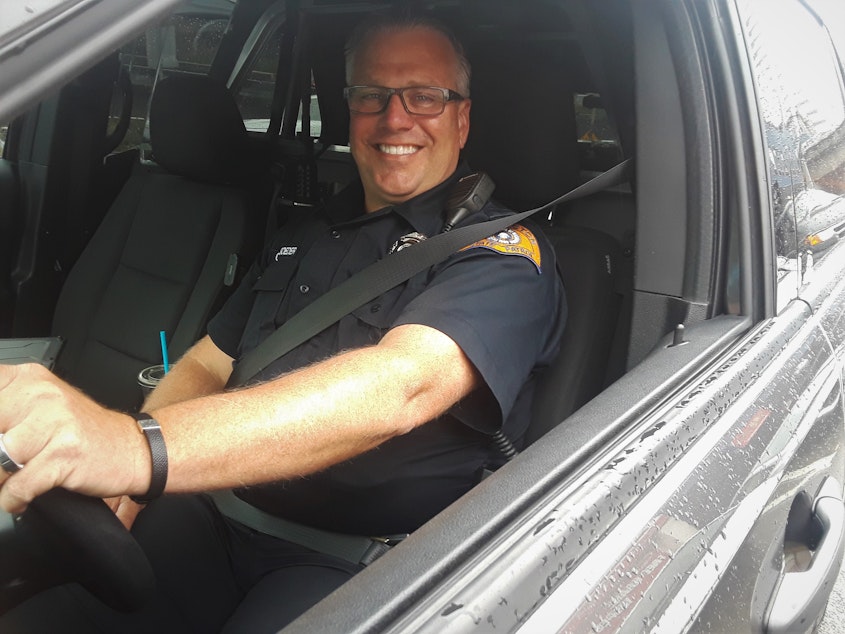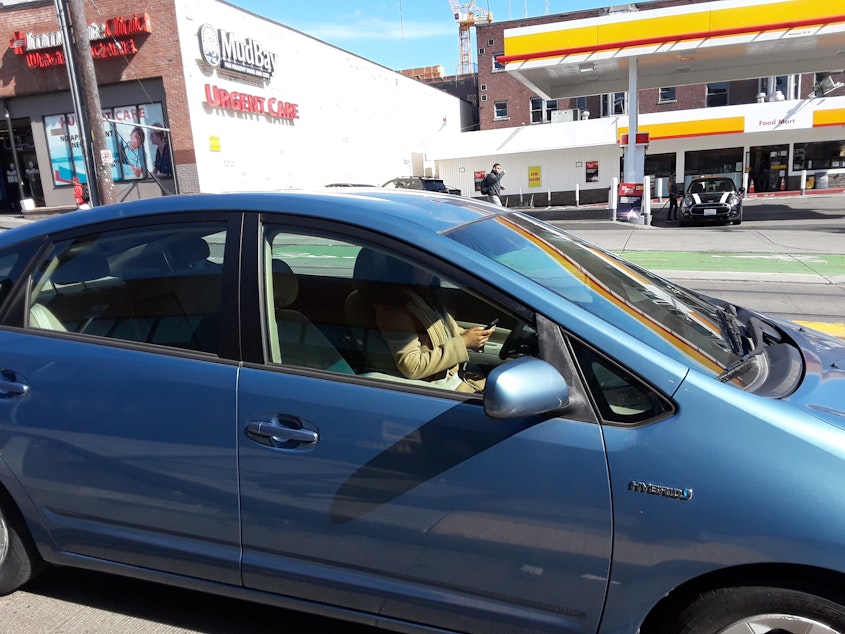A distracted driving ticket in Washington state is $136. Guess how many are issued

Beware Trooper Chuck.
Trooper Charles Schroeder has pulled over the most drivers on their phones of anyone on the Washington State Patrol.
They're like sitting ducks, he said.
“When people are on an electronic device, they're so focused that they have no idea of who or what's around them,” Schroeder said. “A lot of times you're not really even sneaking up on them.”
In the year after lawmakers strengthened the state's distracted driving law, Schroeder pulled over 356 drivers, or roughly one naughty driver per day. The state patrol pulled over more than 21,000 drivers in that time.
We spent a recent morning with Schroeder as he patrolled Interstate 5. KUOW listeners had asked our SoundQs team why it seems like no one gets ticketed for using their phones and driving. They wanted to know, is this law actually being enforced?
About 1 in 10 drivers in the state is distracted behind the wheel, according to research by the Washington Traffic Safety Commission. That leaves 9 of 10 drivers paying attention to the road.
We get frustrated with people who text and yammer into their phones, but we fail to notice those doing the right thing, said Staci Hoff, the commission’s director of research and data.
“It’s still very much a problem, but it’s not as prevalent as people think,” she said.
Forthcoming research suggests that distractions are decreasing. The safety commission conducts an observational survey of drivers every year by positioning researchers on street corners to watch passing drivers.

This year fewer drivers held cell phones compared with previous years. Last year it was close to 6 percent; this year it was nearly half that.
The decrease coincides with enforcement of the new distracted driving law passed by the legislature last year, which outlawed any kind of use of any kind of personal electronic device—not just texting or talking on a cell phone. Now it is illegal to even hold the phone to your mouth and talk on speaker.
Law enforcement agencies across the state ticket on average more than 2,000 people a month for distracted driving, according to state court data. Court records show the Seattle Police Department tickets around 200 people per month.
Trooper Schroeder drives in highway traffic all day— from Auburn to Seattle and back—in an unmarked black SUV with tinted windows. He aims to ticket aggressive drivers, people going too fast, following too closely and basically being jerks. But he has a good vantage point to catch and ticket drivers on their phones, too.
His day starts at 4 a.m. or 5 a.m., sometimes with a stop at the Dutch Bros. Coffee, where his daughter works, for a tall to-go cup of coffee.
“It’s always an excuse of mine to go and visit her and say hi,” Schroeder said.
The early hours suit him. He hates afternoon traffic (but doesn’t seem to mind morning gridlock). “My head's always on a swivel,” Schroeder said. “Watching cars come up in my mirrors, watching all my mirrors, watching cars as they go by me.”
On that recent morning with Schroeder, we moved over to Highway 99 after not finding delinquents on the highway. Within minutes, a speeding white Mercedes weaves in and out of the carpool lane.
Schroeder pulled up behind the car and turns on his flashing lights. Schroeder ran his license; the man’s name was Thairyl Taylor.
“I’m trying to get home to my wife,” Taylor told the trooper.
“Yeah, I could tell you’re in a little bit of a hurry there,” Schroeder said.
“I just had a daughter,” Taylor said and pulled out his phone with a video of his newborn. “I’m talking brand new; she’s like eight days old. And I’m sorry, I apologize.”
Taylor was not on his phone, but he had been following too close, speeding, and illegally using the carpool lane. Also, his insurance expired.
Taylor tries to negotiate down the charges, and Schroeder returns to his car to “check some things out.”
Standing next to his car, Taylor told me that he had four kids, and that his wife is alone with the 2 year old and the newborn, Lyric. He was returning from dropping the others off at school. Taylor worried his wife might get overwhelmed and develop post-partum depression, he said, so that’s why he’s trying to get home so fast. Taylor choked up when I asked how his wife was feeling.
“Under our circumstances, we’re kind of in between homes, she’s doing best as she could,” he said. “It’s just hard to find a place to live right now.”
Taylor said their housing applications keep getting denied. Our conversation was interrupted as Schroeder came back with a ticket.
“Okay, you ready?” he asked. He had fined him $136.
With all those violations and no insurance, Taylor could have gotten a fine of $1,100.
“It's your lucky day. Call it a baby shower gift or whatever,” Schroeder says. “Take care of that baby, alright? You have a safe day.”
Back in the car, Schroeder said his job requires snap judgments, and he believed Taylor—loved that Taylor showed him a video of his baby, in fact.
Schroeder said he believes he has more effect on people if he keeps the interaction friendly, he said.
Back on I-5
We hit heavy traffic—ideal conditions.
In the sea of traffic, Schroeder zeroed in on a black Honda Civic. The driver held the phone up to her mouth and chatted. She was so engrossed in the conversation, she didn't notice when Schroeder pulled behind her with lights flashing.
Parked on the right-hand shoulder, she was flustered, couldn't find her current insurance card, and called her husband.
“Hi sweetheart, guess what? I got pulled over talking on the phone,” she said.
Schroeder ticketed her $136.
“Unfortunately, there’s the bad news,” he said, handing over the wide slip of paper. She took it and reached over to shake his hand.
“Thank you for your service,” she said.
“All right, all right. You have a safe day,” Schroeder said.
Less than two minutes later…
Schroeder spotted a driver in a white truck thumbing the phone in his right hand. Schroeder pulled him over.
“I stopped you for the texting while you’re driving,” Schroeder told the man, a nursing student named George Markovich on his way to class.
“I was looking at a map,” Markovich said.
“Yeaaah, can’t do that,” Schroeder said, checking out his license and registration, and then returning to his patrol car.
Markovich told me he thought that it's OK to look at the phone. And what about the troopers anyway?
“I mean, I see them typing on laptops while they're driving,” Markovich said.
Markovich tries not to text in traffic, but when he’s on side streets “it happens,” he says.
“I try and keep it as short and sweet as possible; if it’s necessary, I’ll pop it out and do it, but I try to abide by the law as much as I possibly can,” Markovich says.
Schroeder comes back and gives him the ticket: $136 dollars.
Back in the car, four minutes go by until there’s another car with a distracted driver. Another traffic stop. Another $136 ticket.
“Alright, you have a safe day,” Schroeder says.
Three people in about a mile and a half. Undoubtedly, more are out there somewhere using their phones as they drive.
“Hopefully you catch all of them you can see,” Schroeder said. “You just hope that they don't hurt anybody.”
Listen to the episode by clicking the play button above or on your favorite podcast app. SoundQs is a weekly podcast where KUOW reporters tackle questions submitted by our listeners.
Have a question about the Seattle region for us to answer? Drop it here (If you don't see the form, hit refresh):





